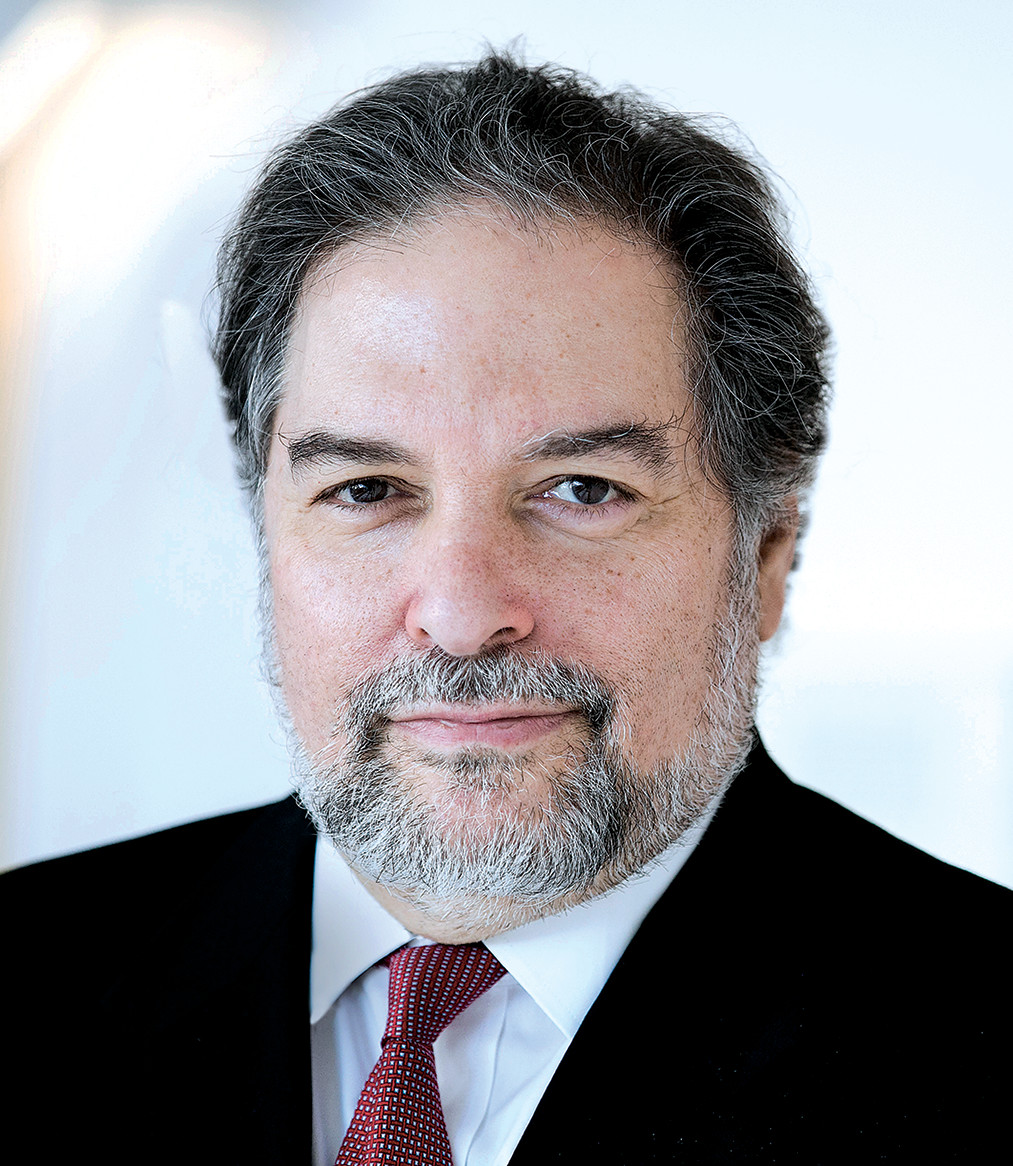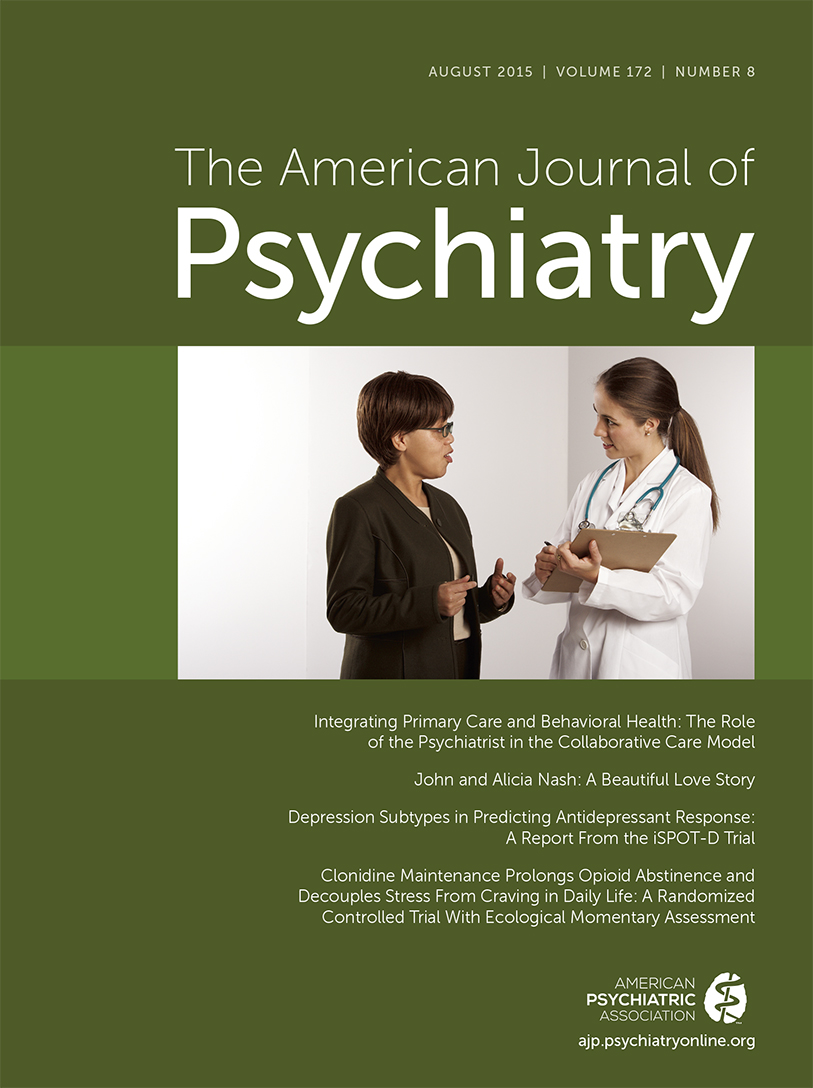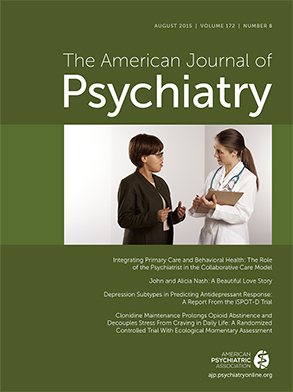Officers and members of the Board of Trustees, leadership and members of the Assembly, councils, state associations, and district branches, Administration of the APA, the Canadian Psychiatric Association, distinguished representatives of international psychiatric organizations, and colleagues, members, family and friends:
Thank you for allowing me the honor of having served this past year as the 141st President of the American Psychiatric Association. It has been both a whirlwind and deeply meaningful experience. I am particularly grateful to my wife, Randy, who has sacrificed the most, and my children and the staff of my department, all of whom have been affected and not always for the better.
So it is a great privilege to come before you to share some observations about our field. Over the past year, I met with people at the frontlines of mental health care. This included parents and patients who have suffered under state budget cutbacks or in insurance-based systems that block needed care. It also included many psychiatrists throughout the United States and elsewhere—most unheralded—who provide essential, often lifesaving care. I have had the opportunity to meet with the faculty and residents of our great academic departments. These are, of course, at the center of our research and education endeavors. What is less appreciated is the degree to which they are the bulwarks of the psychiatric care system for underserved patients, veterans, and medically complex patients. These encounters have been sources of inspiration. In speaking about our field—its science, policy issues, and longer-term prospects—I especially want to speak to those of you who are in training or early in your careers, regardless of where you live on this very small and beautiful planet.
Now one of the advantages of getting older is that you sometimes see things that otherwise may not have always been obvious, and you learn to trust your instincts. And sometimes you even get comfortable enough to speak about what you see.
My kids say that being President of the American Psychiatric Association was my consolation prize for not getting the job I really wanted—President of the United States. And there is some truth to that, although not as much as they think.
Being able to see things that are not obvious to others reminds me of a story about Martin Sheen and Rob Lowe on the television series The West Wing. As you can imagine, it was one of my favorite shows, but more about that later.
There is a wonderful African proverb that says if you want to go fast, go alone, but if you want to go far, go with others. My bias is to look at the long, far view, if for no other reason than change is hard, complex, and always takes longer than we expect. We tend to look for instant transformation, analysis, and understanding, which is not always forthcoming, reliable, or desirable. This is especially true at times of great upheaval and uncertainty, which we are certainly experiencing in the sciences related to psychiatry, and more broadly in technology and culture.
So I want to talk about what we can and what we have an obligation to do together.
We often say that we are in a distinctive or dramatic period in psychiatry. Perhaps this is always true or may appear such at the time. As this meeting will demonstrate, we are in the midst of a profound transformation of our understanding of neuroscience, genetics, and epigenetics. That we have not yet achieved interventions based on these insights or diagnostic tests is not because we will not achieve them, but is due to the complexity of what we are studying. We know that we are also in a period of substantial change in the way health care is organized and financed. Nonetheless, if we remain true to our mission, the ultimate goals of care must be the same as when Francis Weld Peabody, a great physician, spoke from the well of the amphitheater at the Boston City Hospital when he was dying of cancer in 1928. He said, “One of the essential qualities of the clinician is interest in humanity, for the secret of the care of the patient is caring for the patient.”
We are the inheritors of those who have struggled with these issues for many years. Many of these individuals worked with great effort, prescience, and a high sense of calling to get things as right as they could. Often it was, with imperfect information, making the best judgments they could about psychiatric diagnosis. At other times it was crafting public policy or taking a principled stand in favor of medical ethics and not being swayed by the passions of the day. They have handed down to us a solemn responsibility to act in the best interests of our fellow citizens and to be trustworthy stewards of their legacy.
Our work now is but one essential way station on a long journey. We can look back to Dorothea Dix in the 1840s or to the investments of the Commonwealth Fund and the Rockefeller Foundation in the 1920s and 30s. Or we can highlight the post-World War II expansion of mental health services and the Community Mental Health Act as markers on the road to developing more and better treatments and improving access to care.
Indeed, when President Kennedy signed the Community Mental Health Act in October 1963, just prior to his assassination, it had very current goals. These included workforce development, research expansion, and the creation of community mental health centers at general hospitals so that medical care for patients could be integrated.
We are in an era that has great opportunities and challenges, most dramatically in our fundamental understanding of these very complex conditions, and also in our rapidly changing health care environment. While the pace of discovery may appear at times overwhelming, the immediate effect on clinical practice is slower and less clear. However, a closer look suggests that we are beginning to focus, especially in large-scale genome-wide association studies, on key pathways in neurodevelopment, inflammation, and transmitter systems that may be implicated in a range of common disorders.
We are also in midst of the greatest expansion of mental health care and services in the United States in generations, and this phenomena is not limited to one country. Colleagues in Great Britain, India, and China can all describe efforts in their countries to expand access to care and link it more carefully to the full range of medical services.
We have had a long and fruitful recognition of the relationship of general medical illness and psychiatric illness and the importance of complete care in both general medical and psychiatric settings. The vast majority of psychiatric care occurs in general medical offices and inpatient services in general hospitals. And we are beginning to better understand the cost and mortality burden of psychiatric illness and especially its interplay with general medical care and costs. These are not just American issues but also global ones and increasingly will need global solutions.
Periods like ours with rapid developments in science, technology, or society are particularly hard to assess in the moment when one is close to events. This is not unique to our era. It was true when Gutenberg invented the printing press and transformed European culture. It has been true over the past 150 years as great civilizations throughout the world have thrown off the burdens of colonialism and are emerging transformed. The story is told that Henry Kissinger, during the opening to China in the early 1970s, was meeting with Chou En-Lai, the Chinese prime minister, a man of very elegant and patrician bearing. They were making small talk during a photo opportunity. Kissinger said to Chou, “What do you think of the impact of the French Revolution?” Chou paused, looked at Kissinger, and said, “Too soon to tell.”
So immersed are we in the moment that we can be easily forgiven if we can’t see clearly how these changes will affect our views of human nature, our understanding of the brain and mental functioning, and our definition of mental illness. If the discovery of the neuron by Ramón y Cajal in 1888 was a major contributor to the rise of neuroscience in the early 20th century and even influenced Freud’s prepsychoanalytic neurobiologic theorizing, how much more will our perspectives be upended by the flood of work currently under way?
Also to the positive, there is far greater public discussion of mental health and mental illness—from the look of my twitter feed, it is especially young people who are more open and accepting. Whether at the recent Academy Awards or when the President honored a young veteran who committed suicide after his distinguished service, there is more frank and supportive discussion. Because no group is immune to mental illnesses, people suffer from throughout our society. We all know colleagues or friends who approach us, often quietly, with clinical concerns regarding a family member or themselves. And while these conversations often remain private and our public language commonly fails to express a nuanced view of these disorders, it is precisely this widespread suffering which lends bipartisan and indeed global support to achieve better and more equitable care.
Still there are great challenges that stubbornly, seemingly unmovingly, remain with us: longer emergency department waiting times, fewer beds, more patients in prison than in hospitals. Indeed some argue we are back to the era when Dorothea Dix investigated the condition of men and women confined to prisons, jails, and almshouses. In her Memorial to the Legislature of Massachusetts of 1843, she wrote, “I proceed, Gentlemen, briefly to call your attention to the present state of Insane Persons confined within this Commonwealth, in cages, stalls, pens! Chained, naked, beaten with rods, and lashed into obedience.”
And it takes us back to the origins of this great organization. At almost the same time she was beseeching the General Court of the Commonwealth of Massachusetts, the American Psychiatric Association was founded in 1844 by 13 asylum superintendents. Audiences look surprised when I tell them that the American Psychiatric Association is the oldest medical specialty organization in the United States. The explanation is both straightforward and revealing, for the challenges associated with the care of those with mental illness date to the earliest days of our Republic.
Reading about the original structure of our organization, it still sounds familiar today. Included were committees on standards for moral and medical care, statistics on mental illness hospitalizations in the United States, support for the growth of hospital services and scientific publication for the education of physicians. Those early endeavors, however, also included a committee on “asylums for colored persons,” reminding us yet again of the elements of our own history, which we have yet to acknowledge, even in this year when the searing, intolerable images of young African American men’s deaths seemingly fill our lives on a daily basis. There is a substantial mental health toll on the men, women, and especially our children, and they need our care and our voice. I believe that as psychiatrists, addressing this is an essential obligation of our calling.
And much else doesn’t appear to change. Mental illness affects, as ever, the most human and intimate of our capacities. It impacts our ability to understand the world around and in us and it redefines our sense of self. It causes emotional and cognitive confusion. Deeply challenging issues of external and internal perceptions of mental illness are reflected in the experience of Elyn Saks. A distinguished law professor and former college valedictorian, it took 10 years of psychopharmacologic treatment and psychotherapy for her to truly accept that she had schizophrenia. She said it was only after she did that she realized that it didn’t define who she was.
Likewise, the discrimination that patients with mental disorders encounter seems to lessen slowly, if at all, especially when we monitor these circumstances day-to-day. At times our patients and even we are subject to disparagement and harsh criticism. And while these experiences aren’t pleasant, maintaining perspective here as well is essential. We may—and should—disagree strongly with those who are skeptical of, or hostile, to the reality of psychiatric illness. Spend even a few days in any emergency room or care for a patient with severe catatonia who, bedridden and requiring feeding support, gets dramatically better with electroconvulsive therapy, and the reality and impact of mental illness is quite clear. Spend time in any prison, and it is obvious that our system has failed those who are ill when they are offered incarceration instead of care.
While it is, in general, wise to avoid applying psychological interpretations to credible intellectual disputes, forgive me if I am nevertheless left with the nagging sense that the intensity of the critical response to psychiatry may in part be due to the importance of behavior and psychological life to human beings, and indeed the very personal nature of those conditions that upend our sense of self and security in the world. Just as we shouldn’t medicalize the sufferings of everyday life, we cannot and must not ignore the reality of psychiatric illness. But because psychiatric illnesses involve those capacities that make us the most distinctly human, and because these same capacities are essential concerns for most cultures, it is only right and proper that people take what we do very seriously.
The issues of what is considered normal behavior, and when illness impairs responsibility, are weighty and foundational issues for cultures in general, as well as for psychiatry and the law. As such, the attention and concern of those who criticize us, in its own way, clearly reveals the importance of the work we do. It makes it even more important that we do it well, with deep fidelity to science and the essential principles and ethics of medical practice.
It is moreover our responsibility to not only achieve these just ends but to understand, as Lincoln did in describing his melancholy, that it was “a misfortune not a fault,” a message that needs wide, indeed global, dissemination.
I want to close by addressing those of you who are still in training, who are at the beginning of your career, or those of any age who are looking forward to your next career challenge. This brings me back to the story from The West Wing I mentioned at the beginning of my remarks.
In an episode called “Hartsfield Landing,” Martin Sheen is President Bartlet and Rob Lowe is his communications aide, Sam Seaborn.
Bartlet is playing chess with Sam while at the same time resolving a complex China-Taiwan diplomatic crisis. Bartlet’s moves in the standoff are not what they appear to be, nor are they on the chessboard. While talking with Sam, he encourages him to see the “whole board” in both domains. After Bartlet’s full diplomatic moves are successfully completed, Sam now “sees” all the moves and tells Bartlet that he is amazed, asking him how he does it.
Bartlet replies, “You have a lot of help. You listen to everybody and then you call the play. [Rises to his feet] Sam, You’re gonna run for President one day. Don’t be scared. You can do it. I believe in you. [Looks at the board] That’s checkmate.”
So it doesn’t take any particular genius to know that among you are future great clinicians, department chairs, policy leaders, directors of research institutes, future presidents of the American Psychiatric Association, and, yes, perhaps one or two Nobel laureates. Stay focused on your passion, on what you care deeply about; take great care of your patients, your colleagues, and yourselves. Keep your eyes on the distant horizon and on this journey of which all of us are only temporary stewards.
See the whole board, and play the long game. As Goethe was said to have written, “boldness has genius, power, and magic in it”; and if you only act, forces will rise at every turn to support your path. Take advantage of the advice and counsel of your mentors and colleagues. You can do it—people believed in me, and we all believe in you. You have a great opportunity—for a lifetime of stewardship, service, and science. And I’m really, really looking forward to seeing what you will do.
Thank you again for your time and attention and the great kindness and honor of allowing me to serve as your president.


